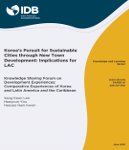Korea's Pursuit for Sustainable Cities through New Town Development: Implications for LAC: Knowledge Sharing Forum on Development Experiences: Comparative Experiences of Korea and Latin America and th
Date
Jun 2015
Under rapid urbanization that took place from around 1960 to 1990, the Republic of Korea has been facing various urban problems such as the expansion of urban slum, traffic congestion and environmental pollution. Among the various responses to these challenges, New Town development can be regarded as one of the most successful and effective strategies, which hasover 50 years of development history in five phases. Korea's New Towns were developed with three main purposes according to the periodic needs: industry support, housing supply, and nationwide balanced development. Phase I New Towns (1962-81) responded to the country's need for industry promotion. Phase II (1967-86), Phase III (1989-95) and Phase IV (2001-present) New Towns were built in response to the severe lack of housing emerged due to over-concentration in the capital and later its metropolitan area, by providing large-scale housing inside Seoul, in the outer ring of Seoul, and in the Capital Area respectively over time. Finally, the most recent Phase V New Towns (2005-present) provided response to the issue of equitable and balanced development across the country. These development yielded outcomes such as housing market stabilization, improvement of housing condition, securement of public and green spaces, economic effect on related industries, and expansion of urban infrastructure.
The paper suggests three success factors of Korea's New Town development. First is feasible planning and concrete implementation strategies that enabled the implementing organizations to overcome conflicts and carry on with the project until completion. The second factor is institutional driving force and legal support which involved establishing a dedicated bureau, defining clear organizational structure and stakeholder roles, and providing timely Acts
to support the land acquisition and construction. The third success factor is reasonable land acquisition methodologies which evolved over time from Land Readjustment to Publically Management Development. This paper also presents Sustainable New own Design Criteria as an important implication for the LAC to consider, which includes social, economic and environmental sustainability that pursue outcomes such as social inclusion, self-sufficiency, connectivity, green space and smart resource management.
Exchanging these experience of Korea and promoting mutual cooperation would be highly valuable for the cities in LAC to minimize the trial and error and maximize the success factors experienced by Korea as an attempt to relieve the challenges of rapid urbanization they are faced with at present. In this regard, it is anticipated that Korea can actively share its accumulated New Town experience and knowledge and act as one of the promising development
partners of the countries in LAC.
The paper suggests three success factors of Korea's New Town development. First is feasible planning and concrete implementation strategies that enabled the implementing organizations to overcome conflicts and carry on with the project until completion. The second factor is institutional driving force and legal support which involved establishing a dedicated bureau, defining clear organizational structure and stakeholder roles, and providing timely Acts
to support the land acquisition and construction. The third success factor is reasonable land acquisition methodologies which evolved over time from Land Readjustment to Publically Management Development. This paper also presents Sustainable New own Design Criteria as an important implication for the LAC to consider, which includes social, economic and environmental sustainability that pursue outcomes such as social inclusion, self-sufficiency, connectivity, green space and smart resource management.
Exchanging these experience of Korea and promoting mutual cooperation would be highly valuable for the cities in LAC to minimize the trial and error and maximize the success factors experienced by Korea as an attempt to relieve the challenges of rapid urbanization they are faced with at present. In this regard, it is anticipated that Korea can actively share its accumulated New Town experience and knowledge and act as one of the promising development
partners of the countries in LAC.




